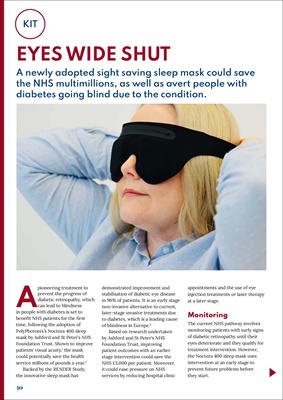
30
KIT
EYES WIDE SHUT
A newly adopted sight saving sleep mask could save
the NHS multimillions, as well as avert people with
diabetes going blind due to the condition.
A
pioneering treatment to
prevent the progress of
diabetic retinopathy, which
can lead to blindness
in people with from diabetic
retinopathy is set to benefit NHS
patients for the first time, following
the adoption of PolyPhotonix's
Noctura 400 sleep mask by Ashford
and St Peter's NHS Foundation Trust.
Shown to improve patients' visual
acuity,1 the mask could potentially
save the health service millions of
pounds a year.2
Backed by the RENDER Study,
the innovative sleep mask has
demonstrated improvement and
stabilisation of diabetic eye disease
in 96% of patients.1It is an early stage
non-invasive alternative to current,
later-stage invasive treatments such
as eye injections or laser therapy,
which is a leading cause of blindness
in Europe.3
Based on research undertaken
by Ashford and St Peter's NHS
Foundation Trust, improving
patient outcomes with an earlier
stage intervention could save the
NHS £3,000 per patient. Moreover,
it could ease pressure on NHS
services by reducing hospital clinic
appointments and the use of eye
injection treatments at a later stage.
Monitoring
The current NHS pathway involves
monitoring patients with early signs
of diabetic retinopathy until their
eyes deteriorate and they qualify for
treatment intervention. However,
the Noctura 400 sleep mask uses
intervention at an early stage to
prevent future problems before
they start.